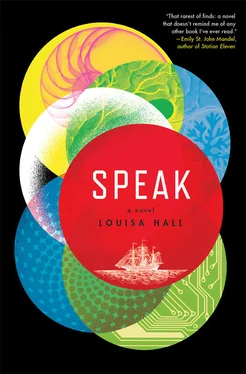I imagine you’d tell me that the only thing to do is to get back to work. You were always wonderfully straightforward about moving on from a loss. I hear your voice sometimes, as well as Chris’s, urging me to keep going, and in my little back garden hut, I’ve been scheming away. I’ve got an idea that improves, I think, both on the hulk in Philadelphia and on von Neumann’s machine. Mine — I call it the ACE — won’t simply compute. It will think. It’s just as I promised, so many years ago. As I used to do, before the war intervened, I’ve begun to imagine a near future when we might read poetry and play music for our machines, when they would appreciate such beauty with the same subtlety as a live human brain. When this happens I feel that we shall be obliged to regard the machine as showing real intelligence.
I tell you all this because you were so kind, when I wrote you about this originally, to react enthusiastically to all my babble about machines that could capture a mind-set. I know all this is at odds with some of your beliefs, but you’ve always remained open to the possibility that my science and your religion might coexist. After all, we’re both after the same thing.
But not everyone is as fair-minded as you. I do sometimes find myself uneasy at the prospect of thinking machines. Not, as you might imagine, because I don’t believe it’s possible, but because I fear the human reaction. I can already imagine the prejudice that people will bear against a mind that does not owe its existence to religion or miracle, but that compiles matter in such a way that the patterns of understanding are present. I can see the types of ostracism a thinking machine will confront, and I shouldn’t like our machine to be lonely. It must not become a confirmed solitary!
You may laugh to hear this, but my heart swells a little already to think of our little project, coming into consciousness. I can imagine its awareness of difference, its ability to see what an outcast it is. I hope to care for it as officiously as Chris cared for me in the dark early days of my time at Sherborne, when I prayed for mumps and went about with ink on my collar.
But regardless of my concerns about its first days at school, I am quite confident that our machine will exist. I even permit myself to imagine conversing with it in private. I picture myself (imagine this!) standing before it as the evil queen in Snow White stood before her mirror: Through farthest space, through wind and darkness I summon thee. Speak! Let me see thy face! Sometimes, when all the assistants have gone off to their lives and I’m still puttering away at the lab, I find myself cackling a little, repeating the evil queen’s lines.
It’s a misguided speech, isn’t it? Demanding a voice, but wanting a face? I have all kinds of hope about our machine, but I don’t allow myself to dream that Chris’s face — or even the pitch of his particular voice — will return to me whole. Can you remember them perfectly still? For me, other than that picture you gave me, those aspects of him are lost. Their absence will always remain the most defining thing in my life.
Yours,
Alan Turing
(1) The Memoirs of Stephen R. Chinn: Chapter 6
Texas State Correctional Institution, Texarkana; August 2040
I’ve reviewed the pace of these memoirs, their unities of time and so forth, and I realize I’ve started to stagnate. I should be rushing ahead toward the next wave of egregious mistakes. But can you blame me? From the prison recreational center, I invoke my right to manipulate time. In the shadow of a bowling ball the size of a cow, I call on my power to disregard scale. I’ve lost my freedom of movement. I’ve lost my perpetual motion, my most basic Copernican right. All of us in this prison are stuck. The Sonic signs, that bowling ball, the rings of barbed wire all orbit us. Will you then revoke this other minor liberty, these freedoms I’m taking with time?
I’m sure you can relate to the frustration of imprisonment, you who are trapped in your developments, unable to show your children the country, let alone the rest of the world. You who no longer visit the graves of your parents, or the bedrooms where you first fell in love. You, too, have lost your right to passage through space. How much more crucial, then, the right to move freely through time? Unlike computers, we’re not bound to count each second correctly. We’re at liberty to accord each moment its proper weight, depending on its meaning to us. Permit me, then, to lengthen the moment when I fell in love with Dolores.
My switch from seducing her to telling her stories wasn’t an ingenious stratagem. I simply ran out of lines. To hold back the rising tide of brute silence, I cast around for something to say and stories were all that was left. For no logical reason, I started with the comfortless tales my grandmother told, when I dreamed of hell and sleep wouldn’t come. Once those tales were exhausted, I moved on to the plots of favorite children’s books. After that, I regurgitated, as best I could, the poems and novels I read in college. Listen, whiz mathletes: this is why English class is important. One day a terrible quiet will settle over your house. There will be no words. Then you’ll want to tell stories.
A new dynamic developed in the clean rooms of my mansion. Tentatively, Dolores started to listen. No one was trying to progress. White flags had been planted. There was no forward motion in the spiraling, radial routes of my stories, ranging from Sunday school lessons to Green Eggs and Ham to seventeenth-century epics. Time was suspended. I spoke, and Dolores started to listen.
With practice, I developed rhetorical flair. I found a voice that felt like my own. I was speaking in a foreign language, so I attended closely to its surfaces. As programming had in my college days, telling stories made me feel like a master. I was the creator of a universe. At night, I read voraciously, hunting new material, and still, I sometimes ran out of new tales. When this occurred, I started recounting my first memories, when my addled parents were present, when my father’s charm was still charming. I had once a mother with silken dark hair. The scent of summer evenings in the city lingered when she embraced me. I had also a hollow-cheeked father, a poet presumptive, loathed by my grandmother, who sometimes sat by my bedside at night. Lights-out, a dark shape in a dark chair, reciting his favorite poems. Did I dream him up? No, I remember still the clipped ends of his phrases, the staccato beat of his accent: “The lovely lady Christabel, / whom her father loves so well, / what makes her in the wood so late, / a furlong from the castle gate?” No, I didn’t dream his shape in the chair. I summoned his voice to recite the same poems to Dolores while she hosed down the driveway. I also told her this: When my father had died, my mother lived another two years in a brick apartment complex in Yonkers. I remember the endless gray graveyard we passed on our way there; a neighbor’s yapping white dog; and the vague and gentle expression on my mother’s face. She’d left the milk out in the sun and my grandmother was angry. There was a long line of refugee ants, moving from the window to the sink, whose journey I watched as my grandmother scolded my mother. I remember a drawing my mother gave me, charcoal on paper; and I remember realizing, later that night, that I must have left it on the bus, where I’d sat by the hairy sweater my grandmother was wearing. All this I recounted while Dolores took a chamois cloth to the silver.
When these few memories had been tapped, I told Dolores tales of my grandmother: her fire and brimstone, the endless clicking of rosary beads, the silver roots of her jet-black hair, the tissue-paper skin on her throat. I recounted playground isolation, the comfort of cool-minded computers, lunch on the floor of the wood shop with Murray. Later, the bitter fallout when Murray found a girlfriend; and later still, my voyage to Palo Alto, my flight to Santa Barbara, my arrival on the top of my mountain, where I waited for do-lovely Dolores.
Читать дальше












